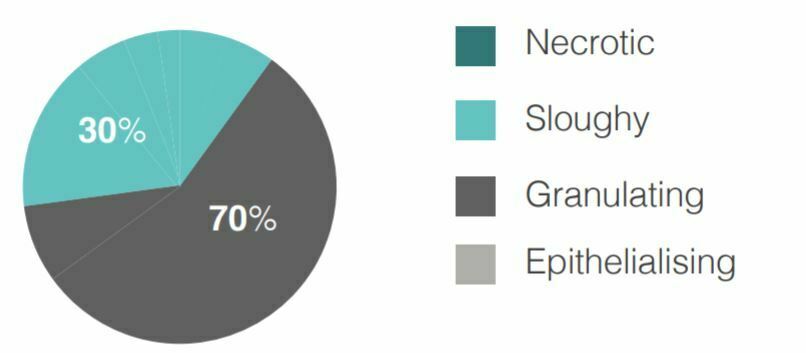BED SORES
MaxioCel - 100% Chitosan Wound Dressing on Sacral And Lateral Thigh Pressure Sores
Center
B.L.Kapoor Hospital
Patient details: 60 years , Female
Diabetes: No
Nicotine Consumption: No
Localized Infection: Yes
Nutritional Status: Malnourished
Co-morbidities: C/o Multiple sclerosis
Previous Medication: 6 months localised treatment with gauze and saline along with compression bandages
Wound History: One year old non-healing chronic pressure sores on sacral region and lateral thigh area,measurements being 8cmx20cmx10cm
Tissue type

Initial Wound Bed Evaluation
| Infection (Local Factors) | Yes | No |
| Exudate | ✓ | |
| Erythema | ✓ | |
| Malodorous | ✓ | |
| Pain | ✓ | |
| Oedema | ✓ |
| Exudate | Dry | Low | Medium | High |
| Levels | ✓ |
| Exudate | Watery | Cloudy | Thick | Purulent | Red |
| Type | ✓ |

DAY 1

DAY 3

Last Day
Wound Management Goals
| Parameters | Yes | No |
| Debridement | ✓ | |
| Infection Prevention | ✓ | |
| Exudate Management | ✓ | |
| Optimum Moisture Maintenance | ✓ | |
| Protect granulation tissue / Epithelializing tissue | ✓ |
End Report
| No of MaxioCel dressings done | 4 |
| Frequency of MaxioCel dressings | Alternate days |
| MaxioCel Variant used | MX1010 |
| Final day wound condition | Wound was clean,signs of infection significantly reduced(exudate reduction, slough reduction),wound circumferences marginally reduced as well. |
Result
| Patient Outcome with Maxiocel | Ease of Application/Removal | Antimicrobial barrier | Wound adherence | Conformability | Wound scar improvement | Pain management |
| Excellent | ✓ | ✓ | ✓ | ✓ | ✓ | |
| Good | ✓ | |||||
| Fair | ||||||
| Poor |
Discussion
- Bed sores-also called pressure ulcers and decubitus ulcers are injuries to skin and underlying tissue resulting from prolonged pressure on the skin. Bedsores most often develop on skin that covers bony areas of the body, such as the heels, ankles, hips and tailbone.
- The use of advanced wound care microfiber dressings in bed sores rather than foam based dressings helps in reducing the dead space between the dressing and the wound bed, therefore not allowing microbial growth at the wound site. Also the microfiber locks in the wound moisture, not letting the maceration or excoriation of peri-wound area and wound margins happen.
- In the shown case, the prime objective was infection reduction and promotion of faster healing because of wound size while
managing exudate which could pool and cause an increase in microbial load. - MaxioCel dressings were initiated as the treatment regimen and within a few dressings significant improvements can be
seen in terms of infection reduction and wound granulation.
 A collaborative study with Harvard Medical School
A collaborative study with Harvard Medical School